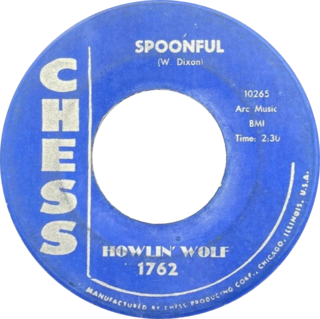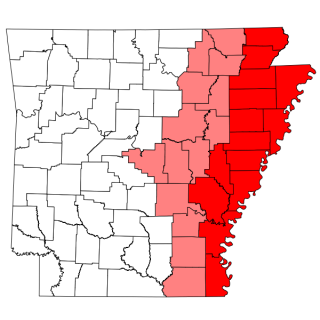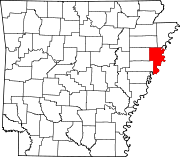
West Memphis is the largest city in Crittenden County, Arkansas, United States. The population was 26,245 at the 2010 census, ranking it as the state's 18th largest city, behind Bella Vista. It is part of the Memphis metropolitan area, and is located directly across the Mississippi River from Memphis, Tennessee.

Chester Arthur Burnett, known professionally as Howlin' Wolf, was a Chicago blues singer, guitarist, and harmonica player. Originally from Mississippi, he moved to Chicago in adulthood and became successful, forming a professional rivalry with fellow bluesman Muddy Waters. With a booming voice and imposing physical presence, he is one of the best-known Chicago blues artists.

Willie Johnson was an American electric blues guitarist. He is best known as the principal guitarist in Howlin' Wolf's band from 1948 to 1953. His raucous, distorted guitar playing is prominent on Howlin' Wolf's Memphis recordings during 1951–1953, including the hit song "How Many More Years".

Hubert Charles Sumlin was a Chicago blues guitarist and singer, best known for his "wrenched, shattering bursts of notes, sudden cliff-hanger silences and daring rhythmic suspensions" as a member of Howlin' Wolf's band. He was ranked number 43 in Rolling Stone's "100 Greatest Guitarists of All Time".

"Goin' Down Slow" or "Going Down Slow" is a blues song composed by American blues singer St. Louis Jimmy Oden. It is considered a blues standard and "one of the most famous blues of all".

"Spoonful" is a blues song written by Willie Dixon and first recorded in 1960 by Howlin' Wolf. Called "a stark and haunting work", it is one of Dixon's best known and most interpreted songs. Etta James and Harvey Fuqua had a pop and R&B record chart hit with their duet cover of "Spoonful" in 1961, and it was popularized in the late 1960s by the British rock group Cream.

"Killing Floor" is a 1964 song by American blues singer-songwriter and guitarist Howlin' Wolf. Called "one of the defining classics of Chicago electric blues", "Killing Floor" became a blues standard with recordings by various artists. It has been acknowledged by the Blues Foundation Hall of Fame, which noted its popularity among rock as well as blues musicians. English rock group Led Zeppelin adapted the song for their "The Lemon Song", for which Howlin' Wolf is named as a co-author.

"Smokestack Lightning" is a blues song recorded by Howlin' Wolf in 1956. It became one of his most popular and influential songs. It is based on earlier blues songs, and numerous artists later interpreted it.
The Howlin' Wolf Story – The Secret History of Rock & Roll is a 2003 documentary featured by Mufaro Berejena about the life of blues legend Howlin' Wolf. It features much new and rare material, including Howlin' Wolf performing "How Many More Years?" on the TV musical show Shindig!, introduced by the Rolling Stones, drummer Sam Lay's home movies of stars of the Chicago Blues from the early 1960s, interviews with Howlin' Wolf's family, Hubert Sumlin, Billy Boy Arnold, Marshall Chess and many others, photographs of Howlin' Wolf and his band through their careers, and much else.

The London Howlin' Wolf Sessions is an album by blues musician Howlin' Wolf released in 1971 on Chess Records, and on Rolling Stones Records in Britain. It was one of the first super session blues albums, setting a blues master among famous musicians from the second generation of rock and roll, in this case Eric Clapton, Steve Winwood, Charlie Watts, and Bill Wyman. It peaked at #79 on the Billboard 200.
"Wang Dang Doodle" is a blues song written by Willie Dixon. Music critic Mike Rowe calls it a party song in an urban style with its massive, rolling, exciting beat. It was first recorded by Howlin' Wolf in 1960 and released by Chess Records in 1961. In 1965, Dixon and Leonard Chess persuaded Koko Taylor to record it for Checker Records, a Chess subsidiary. Taylor's rendition quickly became a hit, reaching number thirteen on the Billboard R&B chart and number 58 on the pop chart. "Wang Dang Doodle" became a blues standard and has been recorded by various artists.

"Sitting on Top of the World" is a country blues song written by Walter Vinson and Lonnie Chatmon. They were core members of the Mississippi Sheiks, who first recorded it in 1930. Vinson claimed to have composed the song one morning after playing at a white dance in Greenwood, Mississippi. It became a popular crossover hit, and was inducted into the Grammy Hall of Fame in 2008.

I Am the Blues is the sixth studio Chicago blues album released in 1970 by the well-known bluesman Willie Dixon. It is also the title of Dixon's autobiography, edited by Don Snowden.

The Arkansas Delta is one of the six natural regions of the state of Arkansas. Willard B. Gatewood Jr., author of The Arkansas Delta: Land of Paradox, says that rich cotton lands of the Arkansas Delta make that area "The Deepest of the Deep South."

"Evil", sometimes listed as "Evil ", is a Chicago blues song written by Willie Dixon. Howlin' Wolf recorded the song in Chicago for Chess Records in 1954. It was included on the 1959 compilation album Moanin' in the Moonlight. When he re-recorded it for The Howlin' Wolf Album in 1969, "Evil" became Wolf's last charting single, reaching number 43 Billboard R&B chart.

Henry Gray was an American blues piano player and singer born in Kenner, Louisiana. He played for more than seven decades and performed with many artists, including Robert Lockwood Jr., Billy Boy Arnold, Morris Pejoe, the Rolling Stones, Muddy Waters, and Howlin' Wolf. He has more than 58 albums to his credit, including recordings for Chess Records. He is credited as helping to create the distinctive sound of the Chicago blues piano.

"Forty-Four" or "44 Blues" is a blues standard whose origins have been traced back to early 1920s Louisiana. However, it was Roosevelt Sykes, who provided the lyrics and first recorded it in 1929, that helped popularize the song. "Forty-Four," through numerous adaptations and recordings, remains in the blues lexicon eighty years later.

Eddie Shaw was an American Chicago blues tenor saxophonist, arranger and bandleader. He led Howlin' Wolf's band, the Wolf Gang, from 1972, both before Wolf's death in 1976 and subsequently.
Echford Lee Cooper Jr., known as Lee Cooper, was an American blues guitarist. Because of his relatively short career and the anonymous role of session musicians in the 1950s, Cooper is said to be "overlooked and highly underrated."
James Yancey Jones, known professionally as Tail Dragger Jones, is an American Chicago blues singer. He has performed since the 1960s and released four albums to date. Jones gained a certain notoriety in 1993, after being convicted of second-degree murder for the killing of another blues musician, Boston Blackie.

















